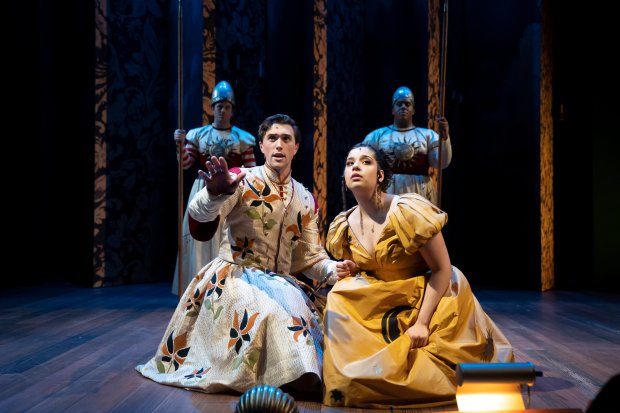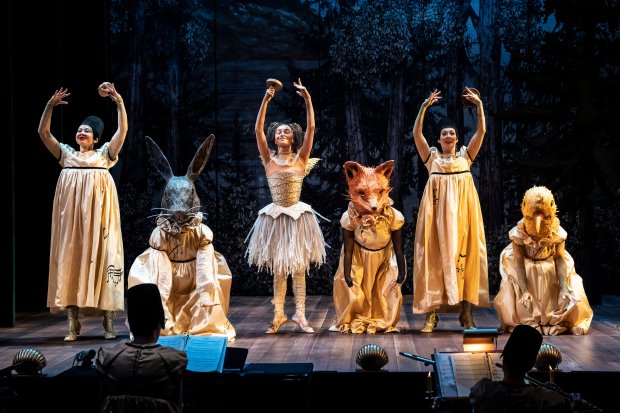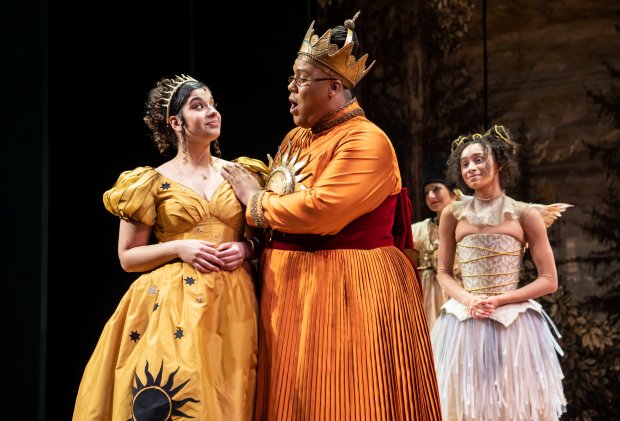[ad_1]
For those of us who have followed Mary Zimmerman’s work for so many years, her latest work, “The Matchbox Magic Flute,” represents a kind of full circle. Beginning his professional career in a former post office building on Chicago’s Belmont Avenue, Zimmerman’s distinctive visual interpretations took him to the Lookingglass Theatre, then the Goodman Theatre, then Broadway and the wide world of grand opera.
It has become a particular favorite of the New York Metropolitan Opera.
So it’s especially wonderful that Zimmerman reduced an allegorical Mozart opera to 10 actors and a five-piece orchestra and premiered it at Goodman’s studio theater in Chicago to a capacity of just a few hundred people. I’ve reviewed a lot of musical theater-related operas in my life, and a few might even say the opposite, but I’ve never seen anything like “The Matchbox Magic Flute” — its small scale allows Zimmerman and his longtime design collaborators Todd Rosenthal, Ana Kuzmanic and TJ Gerckens to put their trademark on this affair. It brings the precision of handmade.
Rosenthal built a kind of chocolate box theater inside a theater here; filled with wings, drops, spotlights, boxes, flickering lamps, and other nomenclature of the small opera houses that were scattered throughout Europe during Mozart’s time in the late 18th century. and later in the United States. Kuzmanic’s costumes are like stories in themselves.
The show basically presents “The Magic Flute,” set in a fantasy forest of trials in the service of love, filled with famous arias like “Der Hölle Rache” sung by the Queen of the Night. In this production, it would be Emily Rohm, who rightfully brought the house down on Monday night with a spectacular delivery of one of Mozart’s most recognizable (and difficult) pieces of music. Emanuel Schikaneder’s libretto has been freely adapted by Zimmerman and now offers many comedic anachronisms, some of which add to the fun, some of which are jarring. Such are the pleasures and temptations of the public sphere.
Rohm is more of a musical theater person than an opera singer, and that goes for most of the cast, including Shawn Pfautsch, Reese Parish, Billy Rude, Lauren Molina, Russell Mernagh, and Tina Muñoz Pandya. Only Keanon Kyles, who plays Sarastro, has significant opera credits in his biography, but you’d bet otherwise when it comes to cheerful young talent Marlene Fernandez, who plays Pamina. Part of the fun here is watching theater performers try their voices at the operatic repertoire and absolutely exceed all reasonable expectations. (Amanda Dehnert is the musical director and arranged and adapted the music with Andre Pluess.)
Most of the track is played for laughs, and I can’t say I find it particularly funny, although some people around me do. In fact, the more emotional episodes of the series (which last two hours) work best; This is no surprise considering Zimmerman’s acting talent. At other times, on opening night, it felt like not everyone had gotten the memo that said “matchbox,” given how some subtle moments were drowned out by overplaying. The show also broke some of its own rules, such as when an actor leaves the world behind and appears on the balcony.
I think Zimmerman and his collaborators could have worked harder on unity of style and purpose, sticking more genuinely to the reality of this story, avoiding seductive campiness, and staying true to their concept even at the expense of a joke or two. At first glance, Zimmerman is a bit caught between period parody and contemporary reinterpretation, and the show veers back and forth. I’m more in favor of the latter.
While it is true that “The Magic Flute” is an extraordinary affair intended by its creators to provide pleasure, there are serious “Candide”-like Enlightenment points about the importance of personal integrity and the necessity of constantly working towards self-improvement. and the power of true love. Although not of interest to this version, at one time much of it consisted of Masonic themes.
But fans of this piece will be more accustomed to seeing it a few blocks away at the massive Lyrical Opera House, where “The Magic Flute” struck long gold and charged accordingly.
Chris Jones is a Tribune critic.
cjones5@chicagotribune.com
Review: “Matchbox Magic Flute” (3.5 stars)
When: until March 24
Where: Goodman’s Owen Theatre, 170 N. Dearborn St.
Working time: 2 hours
Tickets: $35-$105 at 312-443-3800 and www.goodmantheatre.org
 Best American Comics News bestamericancomics.com started its broadcasting life on December 21, 2022 and aims to offer original content to users. Aiming to share information in technology, science, education and other fields, bestamericancomics.com aims to provide its readers with the most up-to-date and comprehensive. Since the content of the site is created by expert writers, readers are reliable and accurate referrers.
Best American Comics News bestamericancomics.com started its broadcasting life on December 21, 2022 and aims to offer original content to users. Aiming to share information in technology, science, education and other fields, bestamericancomics.com aims to provide its readers with the most up-to-date and comprehensive. Since the content of the site is created by expert writers, readers are reliable and accurate referrers.





